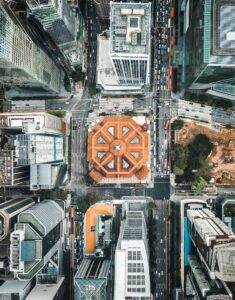Economic development is a complex and multifaceted process that can greatly impact societies and individuals alike. From poverty reduction to job creation, economic development holds immense potential for improving lives and fostering progress.
However, achieving sustainable economic development is no easy feat. There are numerous hurdles that nations must overcome along their journey towards growth. In this article, we will explore these barriers in depth, as well as discuss strategies for overcoming them.
So grab a cup of coffee and join us as we delve into the fascinating world of economic development! Let’s uncover the challenges together and discover innovative solutions that pave the way for prosperous futures.
Defining Economic Development

Economic development is a broad and multifaceted concept that encompasses various aspects of growth and progress within an economy. At its core, economic development refers to the sustained increase in the standard of living, well-being, and overall prosperity of a nation or region.
While economic growth is often used interchangeably with economic development, it’s important to distinguish between the two. Economic growth focuses on quantitative measures such as GDP and employment rates, whereas economic development takes into account qualitative factors such as education levels, healthcare access, infrastructure development, and social welfare.
Moreover, economic development goes beyond mere monetary indicators; it seeks to create an environment where individuals have equal opportunities for upward mobility and improved quality of life. This includes reducing poverty levels, promoting income equality, fostering entrepreneurship and innovation, enhancing human capital through education and skills training programs.
In essence, economic development is about creating sustainable pathways for inclusive growth that benefit all members of society. It involves cultivating strong institutions that promote transparency, accountability,and good governance practices which form the foundation for long-term success.
Understanding this holistic perspective on economic development allows policymakers to implement strategies that address not only short-term gains but also long-term sustainability. By focusing on both quantitative metrics like GDP growth and qualitative factors like social well-being,economies can strive towards balanced progress that uplifts communities while preserving natural resources for future generations.
Theories of Economic Development
When it comes to understanding economic development, various theories have been proposed over the years. These theories attempt to explain the factors that contribute to a country’s growth and prosperity. While no single theory can fully capture the complexity of economic development, they provide valuable insights into different aspects of this process.
One prominent theory is the modernization theory, which suggests that economic growth is closely linked to social and political changes. According to this perspective, as societies undergo industrialization and urbanization, they experience improvements in living standards and an increase in productivity.
Another influential theory is dependency theory, which emphasizes the negative effects of global trade on developing countries. This school of thought argues that developed nations exploit their economic power to maintain control over less developed countries, leading to underdevelopment and poverty.
On the other hand, neoclassical economics focuses on market forces as drivers of economic development. It posits that free markets and efficient allocation of resources will lead to sustained growth.
There are also theories that highlight institutional factors as crucial for economic development. Institutional economists argue that well-functioning institutions such as property rights protection and rule of law are essential for promoting investment and entrepreneurship.
While these theories offer valuable perspectives on economic development, it is important to recognize their limitations. Economic development is a complex process influenced by multiple interconnected factors ranging from cultural norms to geopolitical dynamics.
Understanding these theories helps policymakers develop strategies tailored towards addressing specific barriers hindering progress in their respective countries or regions. By considering multiple perspectives, policymakers can implement comprehensive approaches aimed at fostering sustainable growth and inclusive prosperity for all citizens.
The Barriers to Economic Development
Economic development is a complex process that involves various challenges and barriers. These barriers can hinder the growth of an economy and impede progress towards development. Understanding these obstacles is crucial in finding effective strategies to overcome them.
One major barrier to economic development is inadequate infrastructure. Poor roads, limited access to electricity, and unreliable transportation systems can significantly hamper trade and investment opportunities. Developing countries often face this challenge as they struggle to meet the growing demands of their population.
Another significant barrier is corruption. When government officials engage in bribery or embezzlement, it undermines trust both domestically and internationally. Corruption diverts resources away from productive sectors of the economy, hindering economic growth.
Limited access to finance also poses a significant obstacle for economic development. Small businesses often find it challenging to secure loans or financial support, hindering their ability to expand operations or invest in new technologies.
Inadequate education and skills training are additional barriers that impede economic development. A lack of skilled workers hinders innovation and productivity, limiting overall economic growth potential.
Political instability and conflict are also notable barriers holding back economic development. Uncertain political environments discourage foreign direct investment and disrupt business activities within a country.
Addressing these barriers requires comprehensive strategies focused on long-term solutions rather than short-term fixes. Governments need to prioritize investments in infrastructure projects such as improved road networks, reliable power supply systems, and efficient transportation systems.
Fighting corruption requires robust legal frameworks with strict enforcement mechanisms along with transparent governance practices at all levels of government.
To address limited access to finance, governments must work closely with financial institutions by implementing policies that encourage lending for small businesses while ensuring responsible borrowing practices are followed.
Investments in education and skills training programs are essential for equipping individuals with the knowledge needed for employment opportunities in emerging industries.
Finally, overcoming political instability requires strong leadership committed to creating stable environments where businesses can thrive.
Overcoming the Barriers to Economic Development
It is evident that economic development is no easy feat. It requires careful planning, strategic initiatives, and collaboration among various stakeholders. However, with the right approach and determination, these barriers can be overcome.
One effective strategy for overcoming barriers to economic development is fostering innovation and technological advancements. By investing in research and development, countries can stay ahead of the curve and adapt quickly to an ever-changing global landscape. This not only attracts foreign investment but also creates a skilled workforce capable of driving growth.
Additionally, governments need to prioritize infrastructure development. Accessible transportation networks, reliable power supply, and efficient communication systems are vital for businesses to thrive. By investing in these areas, countries can attract more investors and improve connectivity within their regions.
Furthermore, addressing social issues such as poverty alleviation and education is crucial for sustainable economic growth. Investing in quality education equips individuals with the skills needed for employment opportunities while eradicating poverty ensures inclusivity in economic activities.
Collaboration between different sectors – public-private partnerships – is another key factor in overcoming barriers to economic development. When governments work hand-in-hand with private companies, they pool resources together towards common goals such as job creation or infrastructure projects.
Maintaining political stability through good governance practices plays a pivotal role in attracting both domestic and foreign investments. Transparency in policies encourages trust from investors while reducing corruption fosters a favorable business environment.
In conclusion (without saying “In conclusion”), it’s important to recognize that every country faces unique challenges on their path towards economic development. The road may be bumpy at times; however, by implementing strategies like fostering innovation, prioritizing infrastructure development, addressing social issues head-on through education initiatives and poverty alleviation efforts while promoting collaborative partnerships between sectors along with ensuring good governance practices – societies can effectively navigate through these obstacles on their way toward sustained growth.
